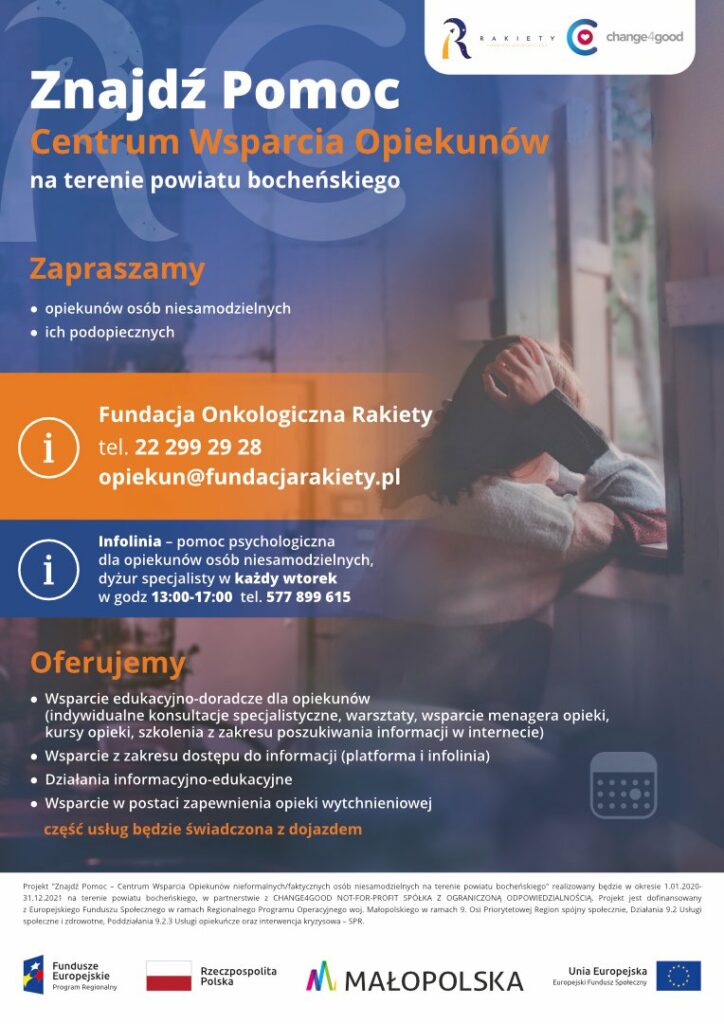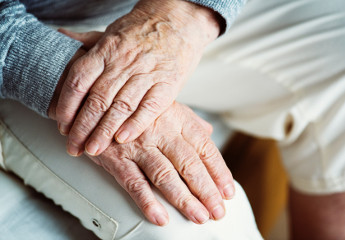

The Rakiety Oncological Foundation in the CHANGE4GOOD NOT-FOR-PROFIT partnership is implementing a project titled: Find Help - Support Center for informal/actual caregivers of dependent people in the Bochnia district
Project goal
providing access to social services for 200 dependent people and their guardians, especially people at risk of poverty and social exclusion living in the Bochnia poviat. This goal will be achieved by offering educational and information services for caregivers; support in the field of specialized individual and group counseling, care courses, support groups, access to the platform and hotline, additionally through information activities for entities acting for the target group and by providing support in the form of caregivers and assistants for dependent people and stays respite for caregivers and their wards.
The aim of the project is to deinstitutionalize the services provided, meaning a transition from institutional care to care provided at the level of local communities. All project activities are carried out based on the principles of equal opportunities and non-discrimination.
Implementation period
The project tasks will increase the availability of social services for 200 people, and the project is implemented in the period: January 1, 2020 - March 31, 2022 in the Bochnia district.
target group
A person who meets all of the following participation criteria may participate in the Project:
and) is a resident of Bochnia County (Lesser Poland Voivodeship) within the meaning of the Civil Code, i.e.
live/stay with the intention of permanent residence,
b) belongs to a group of people:
- a dependent person (may be a minor), i.e. a person who, due to health condition, old age or disability, requires care or support due to the inability to independently perform at least one of the basic everyday activities. A dependent person is a person who, due to impairment of body functions, has activity limitations that require long-term or permanent support of another person in order to meet basic life needs.
or
- an adult informal caregiver of a dependent person, i.e. one who takes care of a dependent person, is not a professional caregiver and does not receive remuneration for care.
Actions
Due to the specificity of the target group and the issues of the project, a mobile nature of the services provided is planned. The center is planned to offer the following services:
- Support of the "care manager" - the local care coordinator. The main goal of the service is to provide substantive support to facilitate the implementation of care in the home environment, as well as to monitor the situation on site, provide advice, instruction and information. The care manager service meets the need to support caregivers in current problems arising from the care they provide. For the Participant, the Local Coordinator prepares an Individual Aid and Support Plan based on the assessment of the health and life situation. The care manager's support is provided to each project participant from the date of preparation of the needs diagnosis until the end of the project implementation period, i.e. until December 31, 2021.
- Individual consultations with a psychologist/lawyer/educator/rehabilitation specialist. Specialized services, the dimensions of which are specified in the Individual Aid and Support Plan for each UP.
- Dependent care courses. The implementation of the service will allow the caregiver to acquire competences in the field of caring for a dependent person, which will be confirmed by a certificate issued.
- Workshops on how to use the platform – caregivers of dependent people will receive training on the functioning of the platform dedicated to informal/actual caregivers of dependent people and care, integrating available information.
- Support groups (via the platform, but also stationary, creating a local group in each commune). The caregivers' participation in the meetings is aimed at: better coping with the emotions that accompany caring for a dependent person, taking a closer look at their own needs, relieving the stress associated with care, learning the reasons for the behavior of a dependent loved one, and exchanging experiences with people in a similar situation and life role.
- Psychosocial training for caregivers – the topics will be tailored to the needs of caregivers receiving support.
- Support in access to information (hotline, online platform). These activities are carried out by providing access to an Internet portal containing a forum, e-learning materials and the creation of an information center - a hotline through which it will be possible to obtain information on the organization of home care, the activities of clinics, day care centers and other places offering support to dependent persons. and their caregivers.
- Information and educational meetings with elements of integration. The aim of the meeting will be to exchange experiences of health care workers, social workers and other services. The meetings will be informative and will provide additional information about the project's online platform and will be a place for exchanging experiences among project participants.
- Assistant services and relief care in the form of support in the form of a dependent person's caregiver for dependent people, support for a disabled person's assistant for dependent people and respite stays. Support as part of burden relief services is addressed primarily to people with disabilities and dependent people whose income does not exceed 150% of the relevant income criterion (for a single person or for a person in a family) referred to in the Act of March 12, 2004. on social assistance. In the case of people exceeding the income criterion who will use burden-relief services, a criterion will be obligatorily applied, taking into account in particular the financial and family situation of dependent persons and their actual guardians, the type of service and the specificity of the target group.
Recruitment is carried out continuously throughout the duration of the project.
Detailed information at the Project Office
street Partyzatów 23 (SANIT2 building)
32-700 Bochnia
Opening hours:
Monday to Friday: 9.00 – 13.00
PLEASE CONTACT US BY PHONE IN ADVANCE TO ARRANGE AN APPOINTMENT DATE
Telephone contact: 662 598 232
E-mail: [email protected]
Total project value: PLN 1,212,456.00
Funding: PLN 1,104,256.92
Funding level: 91 %
The project is co-financed by the European Social Fund under the Regional Operational Program of the Małopolska Voivodeship 2014-2020.

Documents to download:




